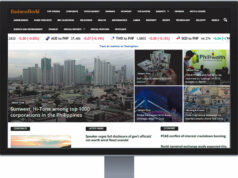The digital consumer in COVID-19 crisis
By Adrian Paul B. Conoza
Special Features Writer, BusinessWorld
Fresh insights on consumers explored in recent Web Wednesdays webinar
The way consumers make use of digital technology has been significantly impacted by the coronavirus disease 2019 (COVID-19) crisis, leaders from top online platforms shared in the Web Wednesdays webinar held by the Internet Mobile Association of the Philippines (IMMAP) and Certified Digital Marketer (CDM) last April 22.
Gara Santos-Ontiveros, industry head of Google Philippines; Chay Mondejar-Saputil, client partner of Facebook Philippines; and Martyn U’ren, head of research for Asia Pacific and Middle East and North Africa at Twitter, shared noteworthy insights on the behavior of digital consumers during the present crisis, from which brands can learn from in adapting to their shifted needs and preferences.
Searches reflecting adaption
Ms. Santos-Ontiveros started her talk by pointing out that brands can serve as beacons during volatility, uncertainty, complexity, and ambiguity (VUCA) situations such as the COVID-19 crisis.
In order to thrive in the current situation, she added, brands are advised to plan around human behavior, which researches have looked into recently.
In terms of adhering to safety measures, Google’s mobility report indicates that Filipinos practice physical social distancing, as observed in the declines in going to retail and recreation areas (-81%), groceries and pharmacies (-59%), transit stations (-82%), coupled with an increase in frequenting residential areas (+26%).
Ms. Santos-Ontiveros further showed the activity of Filipino Google users during the crisis as reflected by the fresh findings from Google Trends.
With a heightened demand to replenish essential items, an “unprecedented adoption” of grocery delivery services was observed in sudden increases in searching for “grocery delivery”.
Filipinos are also found to have increasingly searched about protecting themselves when they venture out, for instance how to sew their own face mask.
With the crisis forcing a remote work setting for many, a +400% year-on-year increase was seen in searches for “work from home” related terms. Since remote work also involves using certain applications, there was also an observed month-on-month increase in searches for “web conferencing”.
Netizens are also seen to have found a new love for cooking or making drinks, as more people search for cooking procedures and recipes online, among them the trending Dalgona coffee.
With increases in searches for “donation” and “PPE” (personal protective equipment), more people are seen to come together to help with donation drives and supporting frontlines.
“While we are in the middle of very big changes,” Ms. Santos-Ontiveros noted, “some things haven’t changed, as we see people turning to YouTube for their passion, from fitness to mindfulness to food and new skills.”
Likewise, from an observed rise in “live” search terms, it was also found that “Filipinos seek connection and continued tradition through virtual event equivalents”.
From these insights mined from Google searches, Ms. Santos-Ontiveros summarizes the behavior of digital consumers under the acronym ADAPT: Assembling critical information and content they need to get by; Discovering new connections and nurturing relationships; Adjusting their routines and schedules to meet the demands of voluntary isolation; Praising everyday heroes who have stepped up in this critical moment; and Taking care of their physical and psychological needs, as well as those of friends and loved ones.
Probing the conversation in PHL
Twitter’s Mr. U’ren, meanwhile, went through the conversations that have taken place among Philippine users in the well-known social media platform, which the research head quipped as “the world’s largest focus group”.
He shared findings from research agency Kantar that 78% believe that brands should help in their daily lives, albeit a challenge is seen from another data stating that 74% think as well that brands might be taking advantage of the present situation.
From those findings, he emphasized that brands are facing a deeper challenge. “The challenge just isn’t understanding where consumers are. The challenge is getting the tone of voice completely correct,” Mr. U’ren said.
He added that it is also a great time to use clear communication to bring out inspiration during this ongoing crisis, citing Coca-Cola’s going “off air for a while” as an example.
Mr. U’ren recommends taking inspiration from academic Hans Rosling, who advised that the trick in making sense of research is going first from numbers, then to information, then understanding — similar to what Twitter has been doing in digging through conversations.
Internal data from Twitter presented in the webinar shows Philippines talking about the coronavirus longer, as evidenced by rising number of engagement in the first suspected case, first confirmed case, the lockdown in Manila, and the expansion of the lockdown.
“What’s really unique about the conversation in the Philippines is that it doesn’t form into a quiet negative space,” Mr. U’ren pointed out.
Interestingly, as found in term clouds, the conversation in the country has been found to move from a state of apprehension towards more focus on positive news of recovery and successful actions.
Twitter internal data has also studied the use of emojis, regarded as a universal language. Emojis with tears remain evident, but indications of hope have been observed with the use of the praying emoji.
Moreover, the data further located hashtags that show support and unity during this crisis, in particular rooting for frontliners. For instance, #ArtforMedPH has showcased individuals creating art and opening for commissions in support of frontliners.
The platform’s data has also seen a significant rise in minutes of video consumption, with notable rises in gaming and technology conversation, which Mr. U’ren said was lead by the launch of video game Animal Crossing during the crisis period.
“At this moment, we’re probably only starting to learn what we feel would be those ‘climate change’ moments,” Mr. U’ren concluded, referring to observed behavioral changes which may remain for a long time.
The next step for their team would be to qualitatively investigate the conversation, he added.
Pivoting business to relevance
For her talk, Ms. Mondejar-Saputil shared practices being done by companies in dealing with the crisis, namely adapting customer communication, re-imagining their business and marketing strategies, and planning their path to recovery.
In terms of a company’s communication, the client partner of Facebook Philippines advised on keeping it proactive and contacting customers frequently. Setting realistic expectations for customers and constantly reflecting on customers’ feedback are also advised.
When it comes to reimagining business, it is highly recommended to alter the current business model and enable the business to aid in response efforts, as observed in a flower shop shifting its product portfolio to sell basic necessities and in ride-sharing services shifting from rides to transporting food donation to medical workers.
Providing alternative customer experiences, such as setting up online platforms and opening delivery services are also recommended.
Showing care and empathy to consumers and contributing to helping society bounce back are fitting focal points in planning a company’s path to recovery, according to Ms. Mondejar-Saputil.
She also shared that Facebook can help business in this matter as it has released a Small Business Resilience Tool Kit that provides helpful information on how businesses can adapt during these difficult times.
“This is a great time to re-strategize, gather information, and plan ahead on what you can do moving forward,” she advised.
To help businesses have more control in mitigating disruption, companies are advised that to give customers assurance that they adhere to safety measures; provide assistance that gets in-touch with them, and bring out new action or experiences like pre-orders or free delivery.
Web Wednesdays is a monthly webinar series by Internet Mobile Association of the Philippines and Certified Digital Marketer, in partnership with ABS-CBN, designed to educate and accelerate digital skills in the Philippines.



